Special Lecture by Joseph Nye
 “Is the American Century Over?” “Is the American Century Over?” |
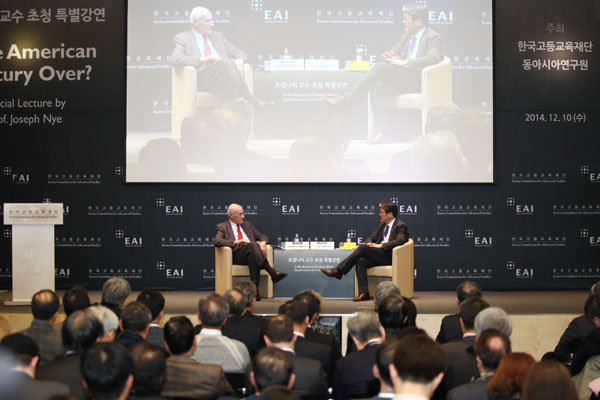 |
On Thursday, December 10, renowned international relations scholar, Joseph Nye delivered a lecture at the Korea Foundation of Advanced Studies co-hosted by the EAI. Professor Nye explained how he believed that the imminent rise of China has often been exaggerated by media and spectators, when evidence that is widely available points to the fact that the American century has not in fact run its course, as many pundits are currently predicting. 
| | |
|
 |
Latest Korea Global Forum Conference Held in Washington D.C.
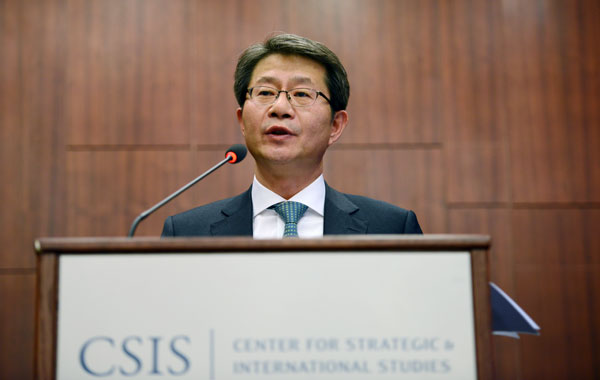 The final Korea Global Forum event for 2014 took place on December 10 in Washington D.C., co-organized by EAI and the Center for Strategic and International Studies (CSIS). Entitled “Preparing for Korean Unification,” the conference brought together Assistant Secretary of State Daniel Russel, Minister of Unification Ryoo Kihl-jae, former Deputy Secretary of State Richard Armitage, and distinguished East Asia experts. This final event of the year capped off a series of international seminars organized by EAI on behalf of the Ministry of Unification, which looked to raise international awareness of the issue surrounding Korean unification and place it in an international context. The final Korea Global Forum event for 2014 took place on December 10 in Washington D.C., co-organized by EAI and the Center for Strategic and International Studies (CSIS). Entitled “Preparing for Korean Unification,” the conference brought together Assistant Secretary of State Daniel Russel, Minister of Unification Ryoo Kihl-jae, former Deputy Secretary of State Richard Armitage, and distinguished East Asia experts. This final event of the year capped off a series of international seminars organized by EAI on behalf of the Ministry of Unification, which looked to raise international awareness of the issue surrounding Korean unification and place it in an international context. 
|
Smart Q&A with Frank Jannuzi: Breaking the Stalemate
 The EAI's latest Smart Q&A session took place with Frank Jannuzi, President and CEO of the Mansfield Foundation. In this session, Jannuzi explains that although the current deadlock that we face in relation to North Korea's denuclearization has left the U.S. frustrated, the international community must continue to try and shape the environment towards negotiation and dialogue. Jannuzi criticizes 6-party talks as a mere functional apparatus for bilateral relations between the U.S. and North Korea, as well as North Korea and South Korea, where he believes the key to denuclearization lies. To this end, he argues that the bilateral relations between North and South are central to this process, and South Korea's attempts at reconciliation via truspolitik provides a plausible avenue to foster regional engagement. Jannuzi purports that right now is a time for South Korea to take the lead as the U.S. is distracted by other issues and somewhat disappointed by its lack of progress in the area. The EAI's latest Smart Q&A session took place with Frank Jannuzi, President and CEO of the Mansfield Foundation. In this session, Jannuzi explains that although the current deadlock that we face in relation to North Korea's denuclearization has left the U.S. frustrated, the international community must continue to try and shape the environment towards negotiation and dialogue. Jannuzi criticizes 6-party talks as a mere functional apparatus for bilateral relations between the U.S. and North Korea, as well as North Korea and South Korea, where he believes the key to denuclearization lies. To this end, he argues that the bilateral relations between North and South are central to this process, and South Korea's attempts at reconciliation via truspolitik provides a plausible avenue to foster regional engagement. Jannuzi purports that right now is a time for South Korea to take the lead as the U.S. is distracted by other issues and somewhat disappointed by its lack of progress in the area.  |
Power and Resistance in Hong Kong, the Dynamics of the Umbrella Movement
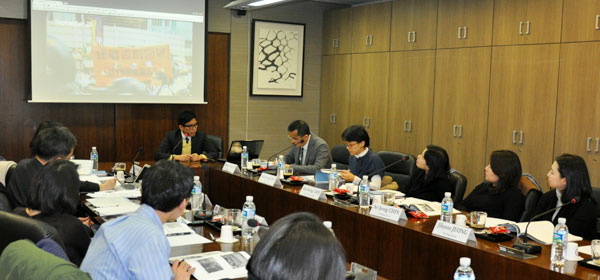 On December 13, EAI held a roundtable discussion under the title "Power and Resistance in Hong Kong, the Dynamics of the Umbrella Movement." The roundtable discussed the meaning of the Hong Kong protests and how it connects to the history of mass movements in Hong Kong. Professor Stan Hok-Wui Wong of the Chinese University of Hong Kong presented on "Protest and Patronage: Electoral Politics in Post-1997 Hong Kong" and Professor Ray Kin-man Yep of the University of Hong Kong offered his insights on the "Umbrella Movement: Generational Divide and Prospect of Democracy of in Hong Kong. On December 13, EAI held a roundtable discussion under the title "Power and Resistance in Hong Kong, the Dynamics of the Umbrella Movement." The roundtable discussed the meaning of the Hong Kong protests and how it connects to the history of mass movements in Hong Kong. Professor Stan Hok-Wui Wong of the Chinese University of Hong Kong presented on "Protest and Patronage: Electoral Politics in Post-1997 Hong Kong" and Professor Ray Kin-man Yep of the University of Hong Kong offered his insights on the "Umbrella Movement: Generational Divide and Prospect of Democracy of in Hong Kong. 
|
EAI Publishes Middle Power Diplomacy Initiative Working Papers No. 9 and 10
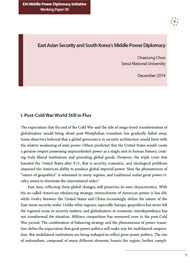 The EAI published two working papers in December as part of its Middle Power Diplomacy Initiative working paper series. The first by Chaesung Chun titled "East Asian Security and South Korea's Middle Power Diplomacy" argues that there is a tendency for Korea, China and Japan to 'overbalance' against each other in attempts to maintain a security balance in the region. He argues that South Korea's middle power is derived from its ability to exercise networking capabilities, where powerful nations are induced into cooperation. "China's Perception of and Strategy for the Middle Powers" authored by Dong Ryul Lee argues that South Korea's value for China lies in the unique relationship the ROK enjoys with the U.S. rather than its middle power status. Lee argues that South Korea needs to expand its independent diplomatic space beyond its identity as an U.S. junior ally and to participate in China-led economic and non-traditional security networks. The EAI published two working papers in December as part of its Middle Power Diplomacy Initiative working paper series. The first by Chaesung Chun titled "East Asian Security and South Korea's Middle Power Diplomacy" argues that there is a tendency for Korea, China and Japan to 'overbalance' against each other in attempts to maintain a security balance in the region. He argues that South Korea's middle power is derived from its ability to exercise networking capabilities, where powerful nations are induced into cooperation. "China's Perception of and Strategy for the Middle Powers" authored by Dong Ryul Lee argues that South Korea's value for China lies in the unique relationship the ROK enjoys with the U.S. rather than its middle power status. Lee argues that South Korea needs to expand its independent diplomatic space beyond its identity as an U.S. junior ally and to participate in China-led economic and non-traditional security networks.  |
Finding Common Ground in the Spirit of Cooperation - UCR November Issue Published
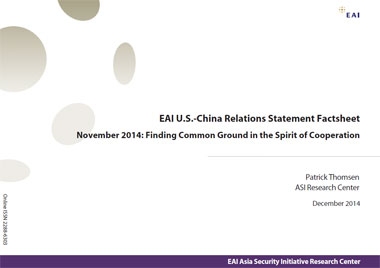 As the international agenda was dominated by multilateral gatherings in November, the UCR Factsheet this month is colored by this cooperative focus. Both the U.S. and China continue to push greater collaboration among nations in the region and prominent issues for November include the U.S. promoting itself as a peace broker in East Asia, advancing the notion that its presence creates a stabilizing effect on relations, pursues greater support for the TPP, and a major breakthrough is made in climate change reduction as the U.S. and China make a joint declaration and commitment to reducing carbon emissions. China continues to focus on its right to sovereignty in territorial disputes and the situation in Hong Kong, goes tit-for-tat with the TPP by pressing forward on its Infrastructure Investment Bank and announces greater support for efforts to control the spread of Ebola. Cooperation is also met with some divergence, the U.S. presses for greater international action on human rights abuses in North Korea, while China argues for dialogue and no sanctions. The U.S. once again pursues Chinese cyber-theft and sabotage. In response, China continues to maintain its innocence, claiming that China too, is also a victim. As the international agenda was dominated by multilateral gatherings in November, the UCR Factsheet this month is colored by this cooperative focus. Both the U.S. and China continue to push greater collaboration among nations in the region and prominent issues for November include the U.S. promoting itself as a peace broker in East Asia, advancing the notion that its presence creates a stabilizing effect on relations, pursues greater support for the TPP, and a major breakthrough is made in climate change reduction as the U.S. and China make a joint declaration and commitment to reducing carbon emissions. China continues to focus on its right to sovereignty in territorial disputes and the situation in Hong Kong, goes tit-for-tat with the TPP by pressing forward on its Infrastructure Investment Bank and announces greater support for efforts to control the spread of Ebola. Cooperation is also met with some divergence, the U.S. presses for greater international action on human rights abuses in North Korea, while China argues for dialogue and no sanctions. The U.S. once again pursues Chinese cyber-theft and sabotage. In response, China continues to maintain its innocence, claiming that China too, is also a victim. 
|
Expert Seminars with Professors Ji-Young Lee and Mathew A. Shapiro
Two Expert Seminars were held in December. On December 8, Professor Ji-Young Lee of American University held a seminar entitled “The Chinese World Order in Practice: Symbolic Domination and Hierarchy in Early Modern East Asia.” On December 18, Mathew A. Shapiro of the Illinois Institute of Technology held an expert seminar titled "International Collaboration and Green Technology Generation." Using patents as his level of analysis, Professor Shapiro argues that R&D clusters among nations are forming in the East Asia region. 
|
EAI Sarangbang Participants Visit Beijing
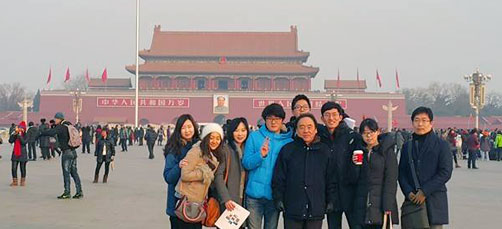 The participants of the EAI Sarangbang program were treated to a special educational trip to China from December 26-28. Seven students traveled with EAI Chairman Young-Sun Ha to Beijing after they had completed a 13-week study program. Plans are in the works to have an E-book published that brings together field research and essays completed by students in the Sarangbang program. The participants of the EAI Sarangbang program were treated to a special educational trip to China from December 26-28. Seven students traveled with EAI Chairman Young-Sun Ha to Beijing after they had completed a 13-week study program. Plans are in the works to have an E-book published that brings together field research and essays completed by students in the Sarangbang program.
|
#909 Sampoong B/D, Eulji-ro 158, Jung-gu, Seoul 100-786, Republic of Korea
Tel 82 2 2277 1683 | Fax 82 2 2277 1684/1697 | Email EAI | Unsubscribe
Copyright 2014© EAST ASIA INSTITUTE. All Rights Reserved. | |

